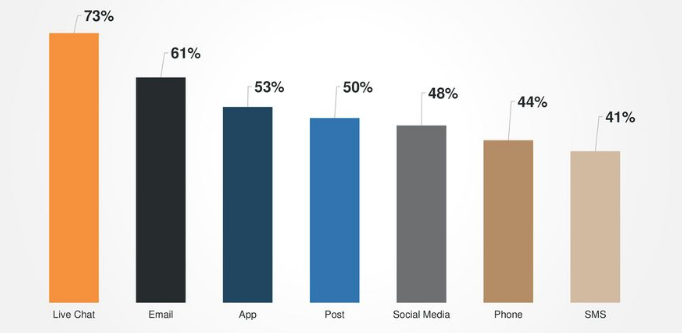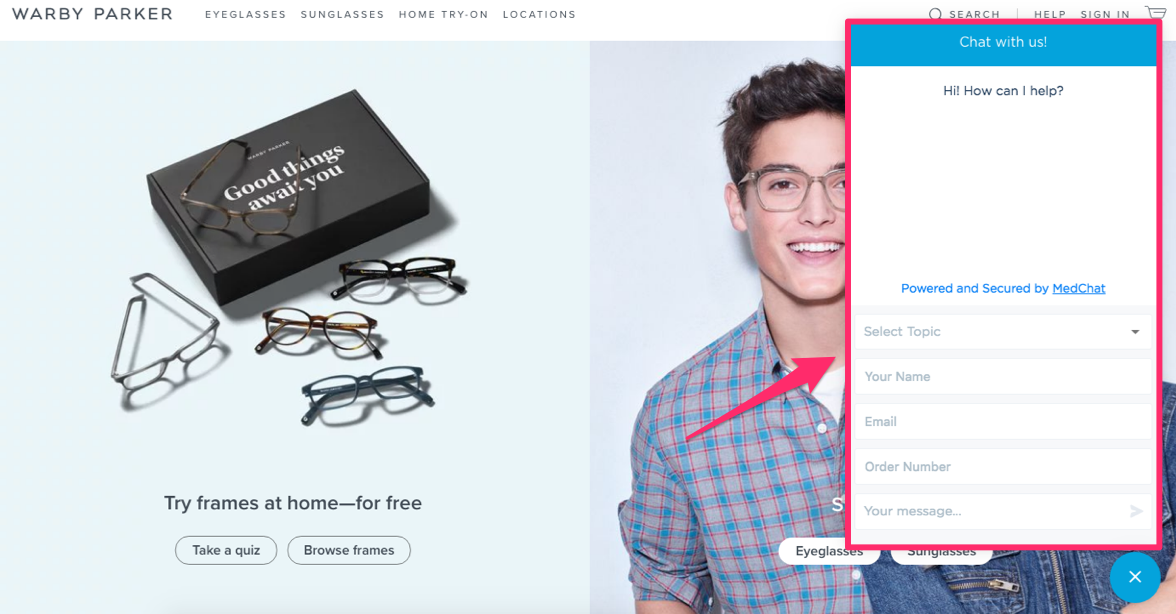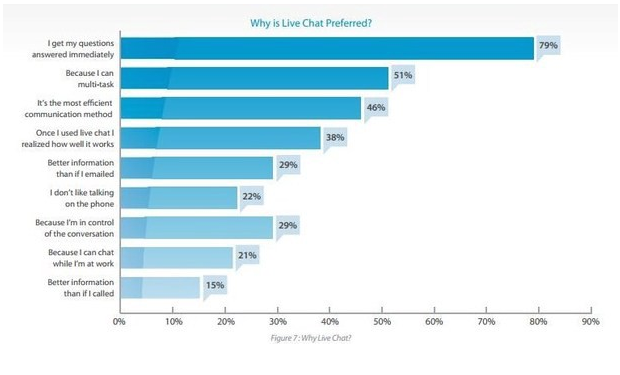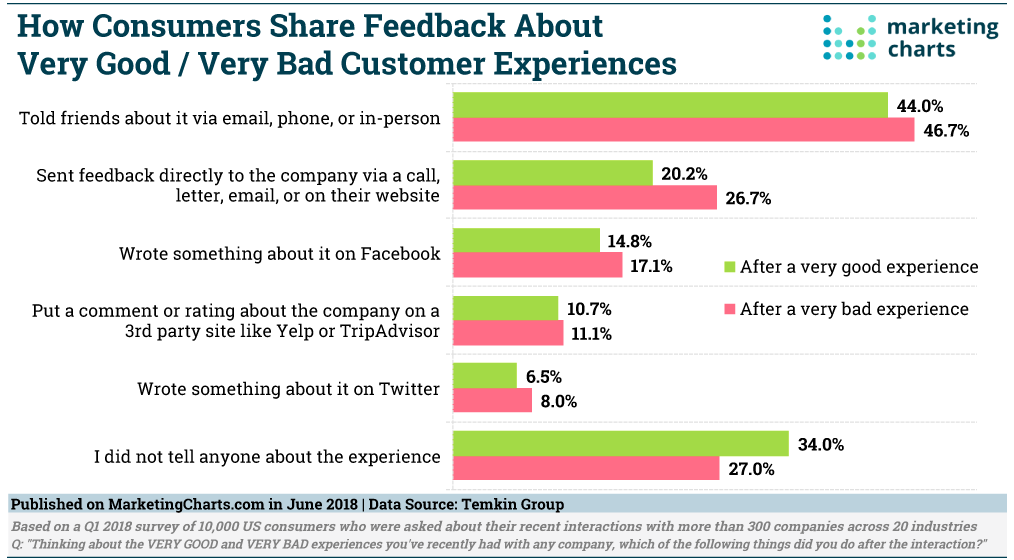It's no secret that businesses need to prioritize the customer experience. Ultimately, keeping your customers happy will help your business grow and prosper.
In fact, 80% of consumers say they're willing to spend more money to have a better customer service experience.
As a business owner, you need to recognize this and adjust your approach accordingly.
Ask yourself if your current customer service strategy is more convenient for you or more convenient for your customers. Here's what I mean.
If the only way to contact a customer service representative at your company is via telephone during business hours on weekdays, that's more convenient for you.
But if a customer has the ability to reach you on weekends or after hours, this will provide them with an enhanced customer service experience.
Improving your customer service may cost you more money. I understand this can be discouraging for some of you.
But as discussed, customers are willing to spend more money for this experience. So you can increase your prices accordingly.
Let's take a look at the most important elements of the customer experience:

If you look through these responses, you'll see a common theme across the board.
Customers want fast response times. This is especially important if they have an issue, need, or complaint. But you also need to provide fast response times for general inquiries.
Your customers want to speak with knowledgeable staff.
They also want the option to reach customer service representatives, regardless of the time of day or their location. The contact method needs to be fast and easy to use.
Implementing live chat addresses all these factors.
For those of you who aren't currently using live chat to connect with your customers, that needs to change.
I'll explain how live chat will improve your customers' service experience and ultimately help you make more money. Here's what you need to know.
Now that we've had a chance to look at the elements of good customer experience, it's time to take those results one step further.
By reviewing those responses, it's logical to assume that live chat would meet the needs and requests of the consumer. But is that really what your customers are looking for?
Absolutely.
Research shows that live chat has a 92% consumer satisfaction rating. This is the highest rating compared to phone support, social media, and email.
Furthermore, when asked directly, consumers cited live chat as their most preferred method of customer service communication:

Live chat is not a new advancement in technology. It's been around for decades.
That said, we're seeing an increase in its availability and popularity in customer service. According to experts, in the next 12 to 18 months, live chat for customer support is to grow by 87%.
It's in your best interest to implement this now, before your competitors beat you to it.
With the popularity of live chat increasing, consumers will be more likely to favor brands offering this most preferred method of communication.
Failure to jump on board with this trend now could result in you falling behind the competition and losing some customers.
Let's say a customer decides they have a question, need help, or have an issue that needs to be addressed. Now what?
They shouldn't have to spend much time searching and scrolling through your website to find a representative. This is a navigation mistake that you need to avoid.
The live chat feature needs to be readily available, or it won't be as effective.
The best way to do this is to provide a live chat pop-up in the corner of your page. Check out this example from Warby Parker:

Your live chat option should be easy to find, even when a website visitor isn't initially looking to speak with a representative.
Just knowing that this option is available will improve their experience. If they don't want to use this feature right now, they can simply minimize the chat window and continue browsing.
I really like this live chat feature from Warby Parker: it's big, but not too intrusive.
Website visitors can continue to navigate and use the site, even while the chat box is open.
This makes it easy for customers to tell your live chat representatives exactly what they need if they have an inquiry that's specific to something on your web pages.
Think about the last time you contacted a business that didn't have a live chat feature. How did you reach out to them?
Chances are you used one of the following methods:
Several times, I've spent over an hour on the phone waiting to speak to a representative. We've all been in this situation before.
You pace around the room listening to terrible hold music or some other automated loop of a voice saying "your call is important to us."
It's frustrating, to say the least.
Email communication isn't much better. This could take days or potentially even longer. I sent an email to an airline a few months ago, and it took them three weeks to respond.
But live chat gives you the opportunity to respond to customer inquiries as fast as possible.
Here's a look at the top reasons why customers say that live chat is their preferred method of contact:

As you can see, getting their questions answered immediately ranked first on this list.
Just implementing live chat isn't necessarily effective if it's taking forever for your representatives to respond. So make sure you properly staff your agents to handle the volume of customer messages.
Even if an agent isn't ready to respond as soon as a new chat starts, there are still ways to keep the customer happy.
You can use automation to your advantage. Set up instant responses using artificial intelligence software asking the customer what they need help with.
Based on the customer's answer, you can connect them with the next available and knowledgeable staff member, but we'll discuss that in greater detail shortly.
You can even gather more information about the customer once the chat is initiated and before an actual person starts responding.
Ask for details such as:
This buys you some time, but it also gives your chat agents more information to further assist the customer as fast as possible.
Once the chat starts, you want to make it clear to your customers that someone is there to respond.
When they ask a question, it may take your agents some time to read through it and research a solution. Plus, not all of your customers will be sending perfect messages.
There could be some spelling and grammar mistakes. They also don't know your products and services as well as you do, so they may not even know how to ask the question properly at first. It could take your agents a minute to decipher the question and understand what the customer needs help with.
But with all of this in mind, it's important to let the customer know that an agent is present. The best way to do this is with a typing indicator.
This shows the customer their question is not being ignored, even though they haven't seen a response yet.
Train your staff to acknowledge all messages from the customer, even before they provide a response.
For example, let's say someone asks a question, but the agent needs a minute or two to research and type the resolution. Rather than having a minute or two of downtime, the agent can respond with something like, "Yes I see what you're talking about."
Then the customer will see the typing indicator as well while the agent continues writing the solution.
Now the customer knows their question isn't being ignored and doesn't think there is a glitch or problem with the live chat platform.
When a customer has a question or problem, it's important it gets answered not only fast but also efficiently.
If you can't come up with a solution for your customers, you aren't providing them with the best possible customer service. It's important to connect your customers with support agents who are able to help them with their problems.
So you need to gather more information about the inquiry before connecting the chat to an agent. Here's a look at how Apple handles this:

Obviously, Apple is a major company with a wide range of products, software, and services.
While overall their staff may be knowledgeable, they have experts for different departments.
For example, if someone has a question about their Apple Music subscription, they will probably be connected with a different agent than someone who is having issues with their Macbook software.
So if your business has lots of departments, you'll want to have some type of filtering system like this as well.
Don't have your agents answer questions they are not qualified to answer. In the event that an agent doesn't know how to provide help, there should be an option for them to transfer the chat to another representative.
Let's say you have retail store locations that sell various home improvement products, furnishings, and electronics.
A customer starts a live chat, indicating they need help with outdoor patio furniture, and then gets connected with a proper associate.
Once their question is answered, they may have another question about installing a sound system in their living room. So the agent could say they'll transfer the chat to someone who specializes in electronics.
Once the chat is over, your customers may want to refer back to the conversation.
This is especially true if they were troubleshooting a problem and the representative offered a step-by-step solution.
The chat transcript also shows you're being completely transparent. It keeps your staff accountable for what they say as well.
It's basically the same concept as phone calls being recorded for quality or training purposes. Sending the transcript to your customers proves you're recording and monitoring the conversations.
This may also reduce the chances of a customer reaching out for help again when they have the same question or forget something that was said.
They can simply refer back to the chat. This is one of the reasons why live chat is more cost-effective than phone support.

Plus, with live chat, your agents will be able to speak with multiple customers at the same time. This can't happen over the phone. But I'll discuss this concept in more detail shortly.
Either way, not only will you be improving your customer experience by implementing live chat, but you'll also be saving money.
This, in conjunction with the consumer willingness to spend more money for better service, is a formula for increased profits.
If you see common questions coming in via live chat, you can use this information to improve your website.
Start an FAQ page.
Write detailed responses to those questions. Customers may search or check this page before connecting with a live chat agent.
If they see their question, they won't even need to contact your customer support team.
The database will also help you improve your products and services.
For example, let's say you're selling a product that requires customer assembly, but you're seeing a huge number of customers asking questions about the instructions.
You may need to go back and re-evaluate those instructions. Make improvements in areas where customers had questions.
This FAQ database will help both you and your customers.
To maximize the efficiency of your live chat, your agents will be dealing with several conversations simultaneously. Make sure they are able to handle this.
Provide proper training so they can navigate between windows and stay organized.
Even if they are knowledgeable about your brand and products, that's useless if they don't know how to properly use the live chat software.
You don't want them to feel overwhelmed, or it will hurt the quality of their responses and ultimately reflect poorly on the customer experience.
Look at how customers respond after they have positive and negative experiences:

They share their feelings on multiple channels of both good and bad encounters. But they are more likely to tell people about bad customer service experiences.
Make sure your staff are friendly. Train them to be both helpful and understanding.
Customers may say things in a wrong way or use incorrect terminology. Don't make them feel bad about it.
Apologize for any inconvenience your product may have caused them. Thank them for reaching out and supporting the business.
Stay engaged. Ask the right questions in response the customer inquiries.
Even if the customer communicates using slang, shortcuts, or acronyms, your staff should always be responding with proper grammar to stay professional.
Your business needs to implement a live chat feature. Ultimately, this will improve your customer service.
Customers prefer live chat over other methods of communication. They want their inquiries answered as fast as possible.
Add a typing indication feature to show customers that an agent is there and working on a response.
Make sure your staff is knowledgeable. If a support agent can't answer a question, allow them to transfer the chat to an expert in that particular department.
Send your customers a copy of the chat transcript so they can refer to it if they need any clarification. Use common concerns to build an FAQ database.
Your support agents need to be able to accommodate multiple conversations simultaneously. Make sure they're trained to be helpful and professional at all times.


